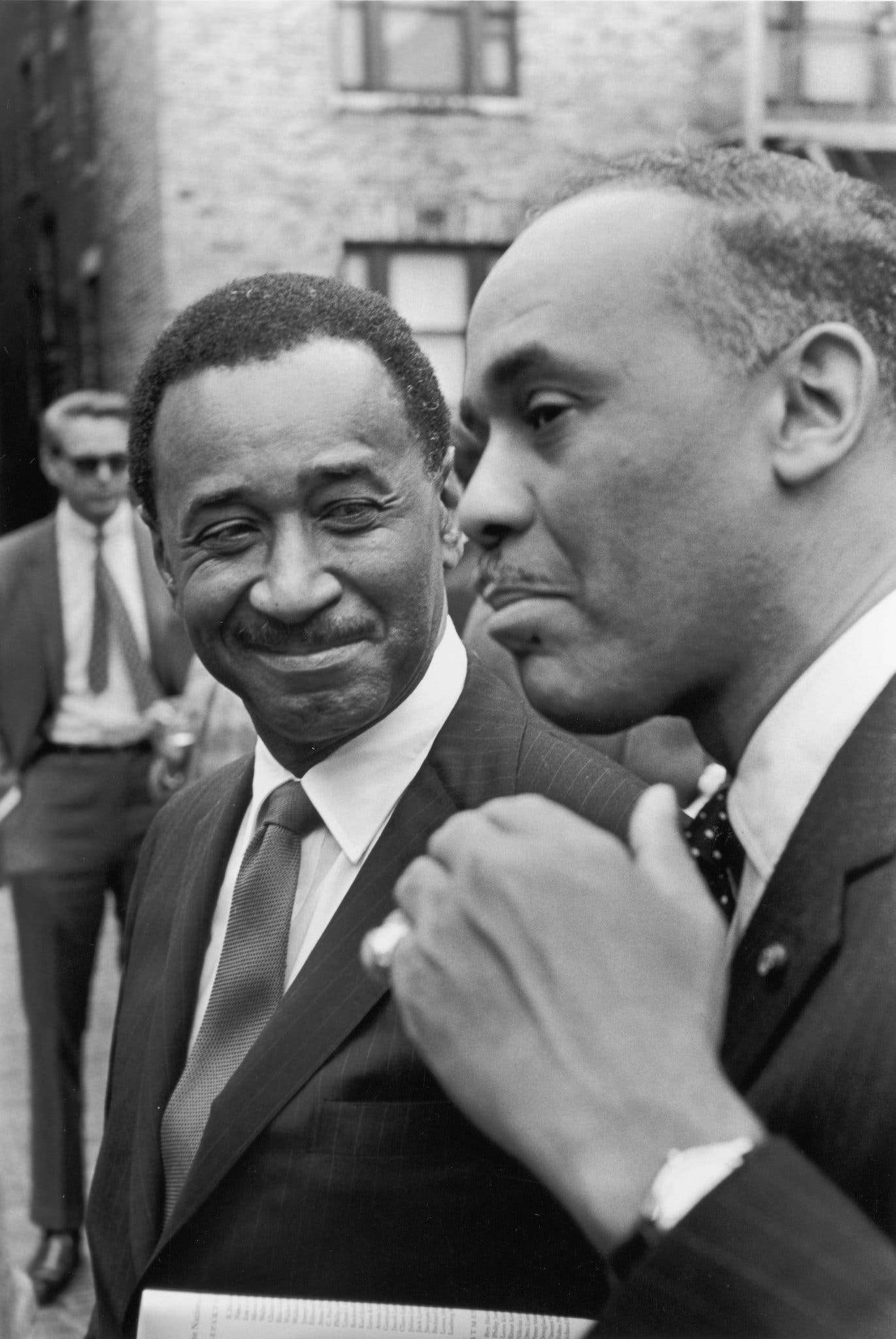
Finished reading: Pax Britannica:The Climax of an Empire by James Morris 📚
Angus was timid and quiet when we brought him home six months ago; now he owns the place.


In many minds Juneteenth is associated with the great Ralph Ellison, which means that this is a good day for me once more to beat the drum for Ellison’s best friend, the equally great Albert Murray. Here’s an essay of mine on what Christians, especially white Christians, need to learn from Murray.

Augustinian blogging has resumed with Cities 8: parallels.
New issue of the newsletter featuring Mozart, Lucie Rie, and catfish & spaghetti.
Cities 8: parallels
In Book XVIII of The City of God, Augustine writes a kind of parallel history of the two cities, drawing on the best sources available to him at the time to show simultaneous developments in the City of Man (Assyria, Babylon) and the City of God (Israel, Judah). It’s a fascinating exercise in comparative ethnography.
Here’s a passage (XVIII.27) that shows what the exercise looks like:
Michah also records this period, after the reign of Uzziah, as the time of his prophecy. For he names the three following kings, named also by Hosea: Jotham, Ahaz, and Hezekiah. These men are found by their own statements to have prophesied simultaneously at this period. To them are added Jonah, also in Uzziah's reign, and Joel, when Jotham, Uzziah's successor, had by now ascended the throne. The dates of those two prophets can be found in the Chronicle, not in their own books, since they say nothing about their times. Those times extend from Procas, king of Latium, or his predecessor Aventinus, to Romulus, now a king of Rome, or even to the opening of the reign of Numa Pompilius, his successor, seeing that Hezekiah, king of Judah, reigned up to that time. So we see that those men, two springs, as it were, of prophecy, gushed out together, at the time when the Assyrian Empire failed, and the Roman Empire started. It was obviously designed that, just as in the first period of the Assyrian Empire, Abraham made his appearance and to him were given the most explicit promises of the blessings of all nations in his descendants, so in the initial stages of the Western Babylon, during whose dominion Christ was destined to come, in whom those promises were to be fulfilled, the lips of the prophets should be opened, those prophets who in their writings as well as by their spoken words gave testimony to this great event in the future. For although there was scarcely any time from the beginning of the monarchy when the people of Israel had been deprived of prophets, those prophets had been solely for the benefit of the Israelites, with no message for the Gentiles. However, when a beginning was made of writings with a more openly prophetic import, prophecies that would be of value to the Gentile nations at some later date, the appropriate time for that beginning was when this city of Rome was being founded, which was to have dominion over the nations.The key point here is that, while the City of Man is hostile to the City of God, is devoted to its own ambitions and the false gods it worships, nevertheless the true God providentially oversees the course of the City of Man in such a way as to bring blessings to His people. The development of prophecy in Israel and Judah is synchronized with the decline of Assyria and the rise of Rome. When a great city arises that will “have dominion over the nations” and will therefore have the power to disseminate knowledge to those nations, then at that moment God inspires the prophets to speak words that will show that he cares for and seeks to save all the nations, not just Israel. And this synchronization of the development of the two cities can be seen as early as the simultaneous rise of Assyria and appearance of Abraham.
Here’s how Augustine concludes Book XVIII:
But now at last we must bring this book to its close. In it we have brought our discussion to this point, and we have shown sufficiently, as it seemed to me, what is the development in this mortal condition of the two cities, the earthly and the Heavenly, which are mingled together from the beginning to the end of their history. One of them, the earthly city, has created for herself such false gods as she wanted, from any source she chose — even creating them out of men — in order to worship them with sacrifices. The other city, the Heavenly City on pilgrimage in this world, does not create false gods. She herself is the creation of the true God, and she herself is to be his true sacrifice. Nevertheless, both cities alike enjoy the good things, or are afflicted with the adversities of this temporal state, but with a different faith, a different expectation, a different love, until they are separated by the final judgement, and each receives her own end, of which there is no end. And those different ends of the two cities must be the next subject for our discussion.As I’ve previously noted, each city in the end gets what it wants — just as individual human beings do. Augustine’s teleological imagination applies at every level, from the personal to the imperial: a person, or a city, may be oriented to caritas — which Augustine defines as “the motion of the soul towards God” — or cupiditas, which is self-love, self-gratification. The person moved by cupiditas becomes, Augustine says, incurvatus in se, curved in on himself, growing ever more crabbed, ever smaller. Think of the Tragedian in Lewis’s The Great Divorce.
But this happens on a cultural level too, the level of the City or Empire: any given society may be growing towards God or seeking its own gratification. The latter kind of society inevitably becomes both sclerotic and isolated — it is always playing a zero-sum game with other societies. (It is not enough that Rome should succeed, Carthage also must fail. Carthago delenda est.) But the City motivated by caritas, like the person motivated by caritas, will grow more expansive — will find and welcome companions along the way, along what Augustine in De Trinitate wonderfully calls “the street of love.” (Cf. the companions — Faithful, Hopeful — that archetypal wayfarer Christian finds in Pilgrim’s Progress.)
I also find myself thinking here of the opposite of Christian’s finding of companions, the breaking of fellowship — which is the theme of one of Cavafy’s finest poems, “Myres: Alexandria, A.D. 340.” The poem is narrated by an Alexandrian pagan, whose dear friend (and perhaps lover) Myres has just died. The speaker goes to Myres’ house to see his friend for the last time, but “the dead boy’s relatives kept staring at me / in strange astonishment and displeasure” — so he remains in the vestibule, he dare not enter. The relatives do not wish to have a pagan interrupt their Christian mourning.
Some old women near me spoke in low voices of the last day of his life — that the name of Christ was constantly on his lips, that he held a cross in his hands. — Then into the room entered four Christian priests fervently saying prayers and supplications to Jesus, or to Mary! (I do not know their religion well.)Myres’ friend reflects that he had always known that Myres was a Christian, though he had not thought about it much; now various reminders of that difference between them, events little noticed when they had occurred, return to his memory. He watches and listens to the prayers, then:
And suddenly a queer impression seized me. I had the vague feeling that Myres was leaving my side; I felt that he was united, a Christian, with his own people, and I was becoming a stranger, a total stranger; I also sensed a doubt approaching me; perhaps I had been deluded by my own passion, and I had always been a stranger to him. — I flew out of their horrible house, I left quickly before the memory of Myres should be snatched away, should be altered by their Christianity.Obviously we are meant to feel for this man who loved Myres; obviously we should, we should grieve with him. But — this is why Cavafy is great — we are also forced to consider the possibility that this doubt that assails him marks something real, substantial: that Myres is indeed separated from this pagan man who loved him and united instead “with his own people” — the people with whom he shares a citizenship in the City of God. “Myres was leaving my side.”
I have often wondered whether this poem was inspired by the great story in the fourth book of Augustine’s Confessions about the illness of the young Augustine’s dearest friend, a friend he had managed to turn aside from the Christian faith:
When he was sick with fever, for a long time he lay unconscious in a mortal sweat, and when his life was despaired of, he was baptized without his knowing it. To me this was a matter of no interest. I assumed that his soul would retain what it had received from me, not what had happened to his body while he was unconscious. But it turned out quite differently. For he recovered and was restored to health, and at once, as soon as I could speak with him (and I was able to do so as soon as he could speak, since I never left his side, and we were deeply dependent on one another), I attempted to joke with him, imagining that he too would laugh with me about the baptism which he had received when far away in mind and sense. But he had already learnt that he had received the sacrament. He was horrified at me as if I were an enemy, and with amazing and immediate frankness advised me that, if I wished to be his friend, I must stop saying this kind of thing to him. I was dumbfounded and perturbed; but I deferred telling him of all my feelings until he should get better and recover his health and strength. Then I would be able to do what I wished with him. But he was snatched away from my lunacy, so that he might be preserved with you for my consolation. After a few days, while I was absent, the fever returned, and he died.And so they too were separated … though, Augustine came to believe, only for a time.
There must be a great divorce between the two cities, then, because they are driven by “a different faith, a different expectation, a different love.” Thus they must be “separated by the final judgement, and each receives her own end, of which there is no end.” Each receives, that is, the end which it has chosen.
But that final judgment of the two cities, that great divorce, is yet to come, and in the meantime — for the time being — “both cities alike enjoy the good things, or are afflicted with the adversities of this temporal state.” To return to a comparison from my first post in this series: the rain falls on Besźel and Ul Qoma alike. We are eschatologically two opposing cities, but topologically linked and paired. If we must be separated one day, that doesn’t mean that we don’t have common cause to make today. Temporary alliances are not as meaningful as eternal fellowship, but they are not meaningless either. We live within this tension and cannot, except through illusion, escape it.
Mo' myrtles


Currently reading: Pax Britannica:The Climax of an Empire by James/Jan Morris 📚
Well, where I come from it’s definitely a word.


Finished reading: Heaven’s Command by James/Jan Morris 📚
Canna lilies grow like crazy in our garden, but I never quite get used to them.

TIL that John Le Carré said that he would refuse the Nobel Prize if it were offered to him, which makes me realize that I have shamefully neglected to consider what to do if the Swedish Academy comes knocking on my door.
Mark Helprin, many years ago:
Tending a fire enforces a sense of patience and tranquility. In that way it is like sailing a boat. You’re engaged by it and trapped by it; fire is captivating. Your time is captured so you have enforced idleness. Like music, it somehow coordinates the rhythms in your brain, or in your soul. It clears the air. Enforced idleness is the way I want to live. I want to be a prisoner of things that make me stop still.
A memory out of nowhere: In Rome for the first time, riding the Metro and seeing across from me a nodding-off municipal employee, with a shoulder badge on her uniform featuring the letters SPQR. I hadn’t known until that moment that the initialism is still in use. It was oddly dizzying.
The crêpe/crepe/crape myrtles around here are at their peak.

Robert Caro on working with Robert Gottlieb:
In all the hours of working on The Power Broker, Bob never said one nice thing to me — never a single complimentary word, either about the book as a whole or about a single portion of the book. That was also true of my second book, The Path to Power, the first volume of the Johnson biography. But then he got soft. When we finished the last page of the last book we worked on, Means of Ascent, he held up the manuscript for a moment and said, slowly, as if he didn’t want to say it, “Not bad.”
As a person who spends a lot of time in Austin, loves Austin, hates Austin traffic, and can’t afford to live in Austin, I was absolutely fascinated by this Lawrence Wright profile of the city as it was and is. Don’t know how I missed it when it came out.
“From tragedy it is seldom but a step to memorabilia.” — Larry McMurtry in Waco, 1993

